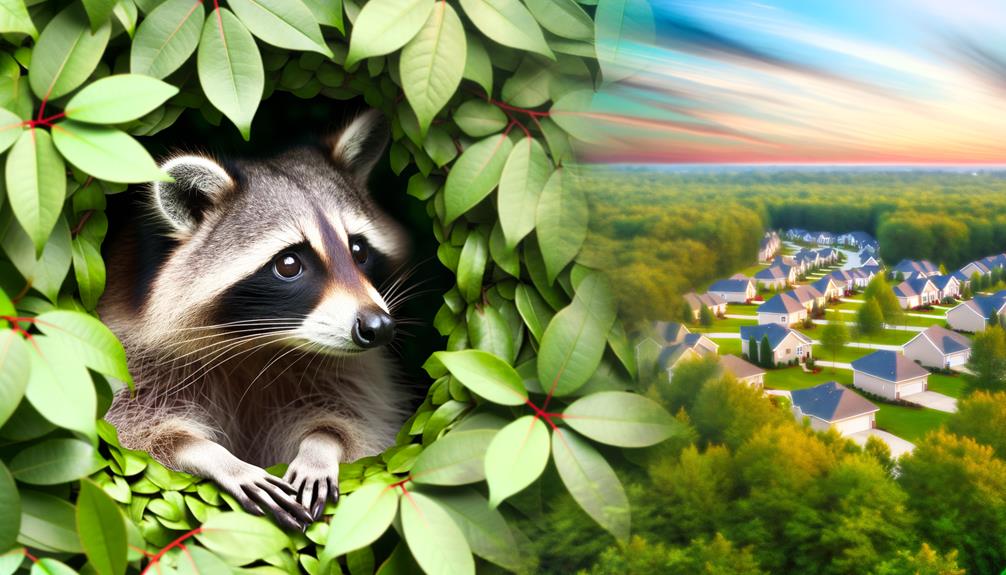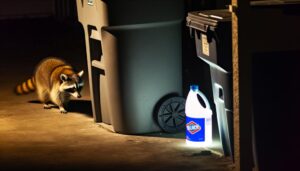Do You Need a License to Have a Pet Raccoon?
Owning a pet raccoon typically requires a license, contingent on regional laws that vary greatly. State and local regulations often mandate permits and enforce restrictions concerning raccoon ownership.
These regulations guarantee compliance with health, sanitation, and housing standards, and violations may result in fines or animal seizure. The licensing process involves detailed documentation, habitat inspections, and adherence to ongoing care requirements.
Additionally, ethical considerations and the potential for disease transmission reinforce the need for regulated ownership. For detailed insights into specific local rules and application procedures, additional exploration is recommended.

Key Takeaways
- State regulations vary: Depending on the state, owning a pet raccoon may require a permit or be outright banned.
- Local laws apply: County and city regulations can impose additional restrictions even if state laws allow raccoon ownership.
- Permits often mandatory: A wildlife permit is typically required to legally own a raccoon, ensuring compliance with local and federal regulations.
- Application process: Obtaining a permit involves submitting detailed documentation and meeting criteria related to housing, veterinary care, and experience.
- Penalties for non-compliance: Owning a raccoon without proper licensing can result in significant fines, animal seizure, and legal repercussions.
Understanding Raccoon Ownership
Understanding raccoon ownership involves thoroughly examining the legal, ethical, and practical aspects of keeping these wild animals as pets. Scientifically, raccoons (Procyon lotor) are known for their intelligence, dexterity, and nocturnal behaviors.
Ethically, potential owners must consider the animal's well-being, including its need for a stimulating environment and appropriate social interactions.
Practically, raccoons require specialized care, such as a diet mimicking their natural food sources and secure enclosures to prevent escape and guarantee safety. Additionally, their propensity for mischief can lead to property damage, necessitating vigilant supervision.
Understanding these facets is critical for those dedicated to providing a responsible and enriching environment for raccoons, securing both the animal's welfare and the owner's preparedness for such a commitment.
State-by-State Regulations
State-by-state regulations governing the ownership of pet raccoons vary significantly, reflecting diverse legislative approaches to wildlife management and public safety.
In states like Arkansas and Delaware, ownership is permitted but requires specific permits to guarantee proper care and containment.
Conversely, states such as California and New York have outright bans due to concerns about disease transmission and ecological impact.
Some states, including Indiana and Maine, have conditional allowances where ownership is permitted but subject to stringent guidelines and regular inspections.
These variations underscore the importance of understanding local laws before acquiring a raccoon as a pet.
Prospective owners must consult state wildlife agencies to navigate the complex regulatory landscape and ensure compliance with all legal requirements.
County and City Laws
Beyond state regulations, county and city laws further complicate the legal landscape for owning pet raccoons, often imposing additional restrictions and requirements tailored to local concerns.
Urban areas may have more stringent regulations due to higher population densities and potential public health risks. For instance, some municipalities may mandate specific housing conditions to prevent raccoons from escaping and interacting with local wildlife.
In contrast, rural areas might have more lenient rules but could still require periodic health checks or containment measures. Enforcement and penalties also vary, with some local governments imposing fines or even confiscation of the animal for non-compliance.
Therefore, prospective raccoon owners must conduct thorough research to guarantee compliance with all applicable local ordinances.
Licensing Requirements
Finding your way through the licensing requirements for owning a pet raccoon necessitates a thorough understanding of both state and local regulations to guarantee full legal compliance. Each jurisdiction may have distinct rules, and failure to adhere could result in significant penalties.
Here are critical considerations:
- State-Specific Laws: Some states outright prohibit raccoon ownership, while others require special permits.
- Health and Safety Regulations: Make sure you meet vaccination and health check requirements to protect both the raccoon and public health.
- Zoning Restrictions: Verify your local zoning laws, as some residential areas may ban exotic pets.
- Renewal and Maintenance: Licensing isn't a one-time task; ongoing compliance and renewals are essential.
Application Process
The application process for obtaining a license to keep a pet raccoon involves the compilation of specific required documentation, adherence to a submission timeline, and meeting defined approval criteria.
Applicants must guarantee all forms are correctly completed and submitted within the stipulated deadlines to avoid delays.
The criteria for approval typically include an evaluation of the applicant's ability to provide appropriate care and habitat for the raccoon.
Required Documentation
Obtaining a license for a pet raccoon involves the submission of several specific documents to secure compliance with state and local regulations. Proper documentation confirms that the pet owner is acting responsibly and ethically.
The required documents typically include:
- Proof of Vaccination: Confirmation that the raccoon has received all necessary vaccinations to safeguard public health.
- Veterinary Health Certificate: A detailed report from a licensed veterinarian affirming the raccoon's overall health and well-being.
- Permit Application Form: A completed application form provided by the relevant state or local authority.
- Proof of Residency: Documentation to verify that the applicant resides in a jurisdiction where owning a raccoon is permitted.
These documents collectively secure that both the raccoon and the community are protected.
Submission Timeline
Adhering to the submission timeline is essential for ensuring the timely and efficient processing of a pet raccoon license application. Applicants should note that the process typically includes a series of clearly defined deadlines.
To start with, all required documentation must be gathered and submitted at least 30 days prior to the intended date of acquisition. Additionally, any supplementary information or corrections requested by the licensing authority should be provided within 15 days of notification.
Delays in meeting these timelines may result in prolonged processing times or potential rejection of the application. As a result, meticulous attention to the submission timeline enhances the likelihood of a smooth and successful licensing process, thus facilitating responsible pet ownership and adherence to regulatory standards.
Approval Criteria
Approval for a pet raccoon license hinges on meeting specific criteria designed to guarantee the well-being of the animal and compliance with regulatory standards. Applicants must provide detailed information and demonstrate their capability to properly care for a raccoon.
The following criteria are essential:
- Housing Requirements: Detailed description and photos of the raccoon's living environment, validating it meets size and safety standards.
- Veterinary Care: Proof of arrangements with a qualified veterinarian experienced in exotic animal care.
- Experience: Documentation of prior experience or training with raccoons or similar wildlife.
- Local Regulations: Evidence of adherence to local and state laws regarding exotic pet ownership.
These criteria safeguard the raccoon's health and safety, aligning with ethical standards and regulatory compliance.
Health and Safety Standards
Health and safety standards for pet raccoons require strict protocols in vaccination and disease control to prevent zoonotic transmission.
Additionally, maintaining high levels of sanitation and habitat cleanliness is vital to guarantee the animal's well-being and mitigate health risks to humans.
These measures are necessary for fostering a safe and healthy environment for both the raccoon and its owner.
Vaccination and Disease Control
Securing that pet raccoons are properly vaccinated is crucial to preventing the spread of zoonotic diseases and maintaining public health standards. Vaccination protocols for raccoons should include rabies, canine distemper, and parvovirus, among others. Failure to adhere to these protocols can result in severe health risks for both the animal and humans.
The following are essential vaccinations and health considerations:
- Rabies: Highly contagious and fatal, rabies can transmit from raccoons to humans.
- Canine Distemper: This viral disease can affect respiratory, gastrointestinal, and nervous systems.
- Parvovirus: Affects raccoons' gastrointestinal tract, leading to severe dehydration and death.
- Feline Panleukopenia: Another highly contagious virus, often fatal, affecting the blood cells.
Proper vaccination safeguards raccoons' health and protects public safety.
Sanitation and Habitat Maintenance
Maintaining a clean and secure habitat for pet raccoons is paramount to ensuring their well-being and preventing potential health hazards. Regular sanitation efforts, including daily removal of waste and uneaten food, are essential to mitigate the risk of bacterial and parasitic infections.
Habitat maintenance should encompass secure enclosures with appropriate bedding material, ensuring that the living environment is devoid of sharp objects and toxic substances. Weekly thorough cleanings using pet-safe disinfectants will further prevent the build-up of harmful pathogens.
Additionally, providing enrichment activities, such as climbing structures and foraging opportunities, contributes to their mental and physical health. Adhering to these detailed sanitation protocols not only promotes the raccoon's health but also safeguards the household from zoonotic diseases.
Wildlife Permits
Obtaining a wildlife permit is an important step in legally owning a pet raccoon, as it guarantees compliance with local and federal regulations designed to protect both the animal and the ecosystem.
Wildlife permits guarantee that raccoon owners adhere to specific guidelines aimed at safeguarding public health, preventing ecological disruption, and promoting animal welfare.
The process of obtaining a permit typically involves:
- Application Submission: Detailed documentation of the raccoon's origin and intended living conditions.
- Inspection: A thorough inspection of the habitat to confirm it meets stipulated standards.
- Education: Mandatory educational programs on raccoon care and environmental impact.
- Annual Renewal: Regular reevaluation to maintain permit validity and compliance with evolving regulations.
Penalties for Non-Compliance
Non-adherence with licensing requirements for pet raccoons can result in significant penalties, including substantial fines and potential legal consequences.
Additionally, authorities may seize the animal, posing a serious risk to both the pet and its owner.
These measures are designed to enforce regulations and safeguard the welfare of both wildlife and the community.
Fines and Legal Consequences
Failure to obtain a proper license for a pet raccoon can lead to significant fines and legal consequences, reflecting the importance of regulatory compliance. These penalties emphasize the need to follow wildlife regulations to guarantee public safety and animal welfare. The repercussions for non-compliance can be both financially and legally severe:
- Monetary Fines: Fines can vary from hundreds to thousands of dollars, depending on local and state regulations.
- Court Appearances: Offenders may be required to attend court, incurring legal fees and time burdens.
- Criminal Records: In some jurisdictions, harboring an unlicensed raccoon can lead to a misdemeanor or even felony charges.
- Community Service: Courts may mandate community service obligations, entailing a significant time commitment.
These penalties underscore the seriousness of non-compliance.
Animal Seizure Risks
Animal seizure by authorities represents a significant risk for individuals keeping raccoons without the necessary licenses, reflecting stringent enforcement of wildlife regulations to protect both public safety and animal welfare. Unauthorized possession can lead to immediate confiscation of the animal, often accompanied by legal repercussions. Below is a table summarizing potential consequences:
| Violation | Penalty | Impact |
|---|---|---|
| No License | Animal seizure | Loss of pet, emotional distress |
| Repeat Offenses | Increased fines, seizure | Financial burden, potential legal action |
| Public Safety Threat | Animal euthanasia, legal penalties | Severe emotional impact, criminal record |
These measures underscore the importance of compliance, emphasizing that non-adherence can result in severe penalties affecting both the owner and the raccoon.
Ethical Considerations
When considering the ethical implications of licensing pet raccoons, it is essential to examine the potential impact on both the animals' well-being and the ecosystem. Raccoons are wild animals that have intricate social structures and specific environmental needs. Keeping them as pets can lead to several ethical concerns:
- Psychological Stress: Raccoons can experience significant stress when removed from their natural habitat, leading to behavioral problems.
- Health Risks: Both raccoons and humans are at risk of disease transmission, which can have severe health implications.
- Environmental Disruption: Capturing raccoons from the wild can disrupt local ecosystems, affecting biodiversity.
- Welfare Neglect: Without proper care and understanding of their needs, raccoons may suffer from neglect and inadequate living conditions.
These factors highlight the ethical complexities involved in licensing pet raccoons.
Alternatives to Pet Raccoons
Considering alternatives to pet raccoons, it is prudent to explore options such as domesticated animals or specialized wildlife rehabilitation programs that can provide similar companionship or engagement without the associated ethical and ecological concerns.
Domesticated animals like dogs and cats have been selectively bred over generations to live harmoniously with humans, offering predictable behavior and ease of care.
Additionally, wildlife rehabilitation centers often provide opportunities for individuals to volunteer, fostering a profound connection with native species while contributing to conservation efforts. Such programs not only ensure the well-being of wildlife but also enrich human understanding of local ecosystems.
Conclusion
Finally, while the appeal of raccoon ownership may be captivating, maneuvering through the intricate network of state, county, and city regulations is essential. Licensing prerequisites and wildlife permits are often obligatory to guarantee both human safety and animal well-being.
Despite potential objections pointing out the raccoon's ability to adapt to domestic life, ethical concerns and legal consequences highlight the significance of adherence.
Consequently, potential owners should contemplate alternative pets that fit more harmoniously with regulatory frameworks and ethical guidelines.






